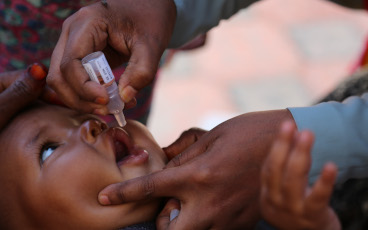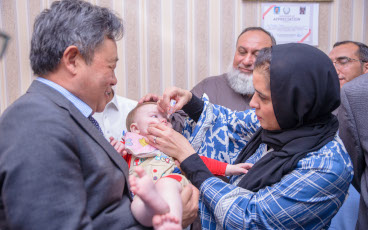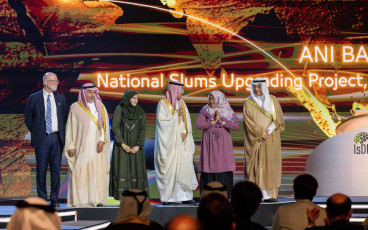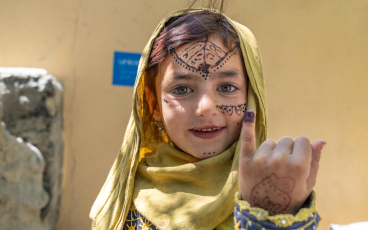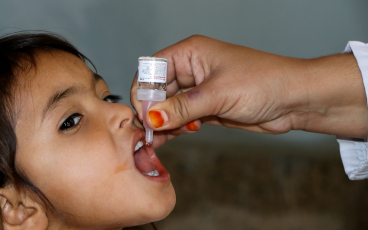Punjab’s dholwallas – the drums of change for polio eradication in Pakistan
Using creative and locally acceptable social behaviour change outreach tactics to engage communities in building trust and reaching children with polio vaccination
The sound of drums is enough to rouse even the sun, prompting it to wrestle the early morning smog for a front-row seat in a local Pashtun community in Rawalpindi, Pakistan. As tea stall owners set up shop for the day, curious women peek out of their windows, and excited children rush out of their houses to flock around the mysterious drummer. And as he moves from street to street, they run alongside him. Flushed with excitement, they start dancing to the familiar local tunes, some of them falling over each other. All smiling. It is a welcome distraction on a cold January morning.
This lively scene, however, is no accident. A banner draped around the drummer carries a powerful message: “Let’s vaccinate our children regularly to eradicate polio. The upcoming vaccination campaign begins on 8th January. Help us vaccinate your children whenever a health team visits your house.” This ‘attention-grabbing’ approach, blending cultural traditions with polio awareness campaigns, is the brainchild of UNICEF’s Social Behavior Change team working with the government’s Provincial Polio Emergency Operations Centre in Punjab.
Leading this creative team is Sajida Mansoor, who understands that information overload on polio vaccination can overwhelm parents, at times to the point of inaction.
“Out-of-the-box thinking was required to respond to the challenge. That’s how we came up with this unconventional but fun idea of using drums to spread awareness and highlight key immunization dates to reach children, especially those who were consistently missing polio vaccination,” says Sajida, a long time UNICEF staffer supporting polio eradication efforts in the country.
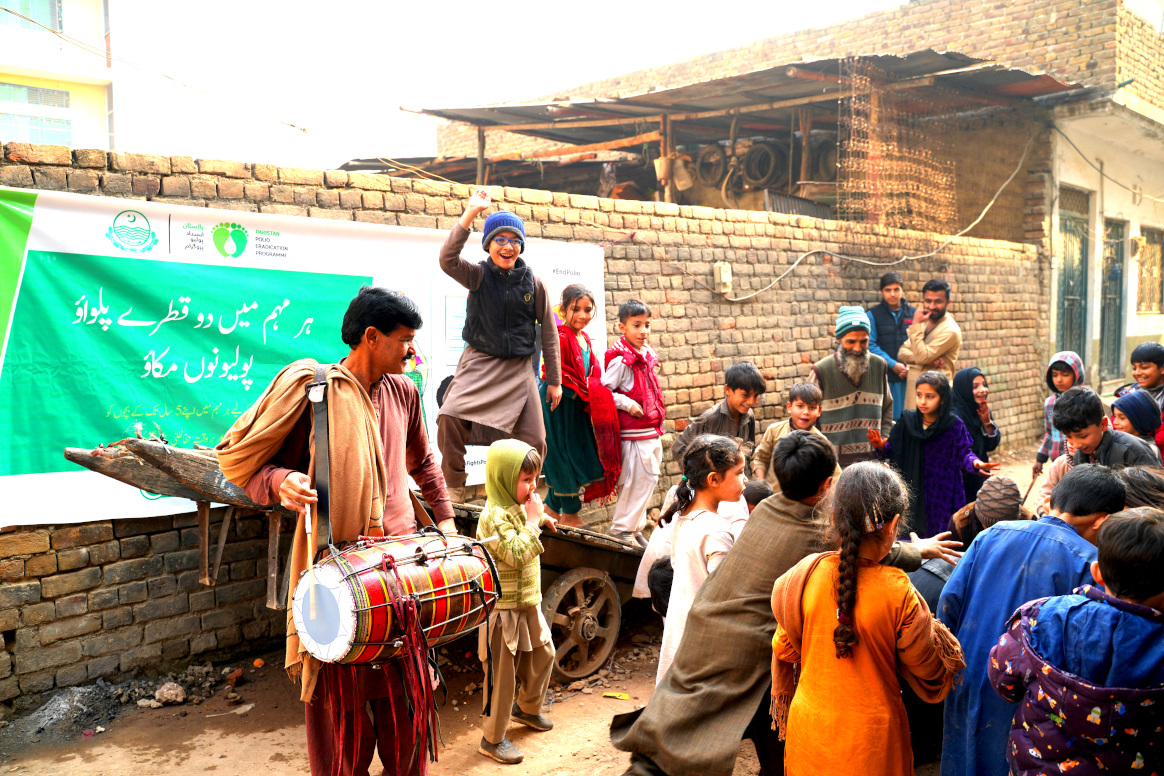
Zafar Iqbal, the drummer, suddenly stops playing, to allow the call for prayers from the local mosque to be heard in the community. Zafar is a seasoned professional musician who sustains his livelihood by showcasing his talent at various cultural events when he is not engaged with the polio eradication programme.
But the polio percussion show isn’t over yet. Joining Zafar at center-stage is seven-year-old Gul Bahisht. She confidently delivers a brief speech she has composed: “Do you know Pakistan is very close to finishing off polio? But I learnt that the virus is still spreading in our area and can paralyze children. We must vaccinate all children and protect them from being hurt and disabled from polio. I have been vaccinated. Why not vaccinate your child too. It’s easy and simple. Just two drops for your child in every campaign and we will all be free from polio forever.”
Zafar picks up where he left off and the rhythmic beat of his drums resume, bringing immense laughter and joy to the delighted children and their families in the neighborhood.
This engaging strategy has struck a chord with local communities. In neighborhoods where the initiative was first introduced, parents became more receptive. Mother and fathers happily opened their doors to polio vaccination teams. It enabled them to vaccinate a large cohort of children who had consistently missed vaccination due to reasons cited as ‘not available,’ which often meant the parents did not open their doors to vaccinators. Children embraced the teams without distrust, resulting in more efficient vaccination coverage.
This achievement underscores the importance of extending the initiative to other neighborhoods in future campaigns, particularly in communities where some children consistently miss their vaccinations.
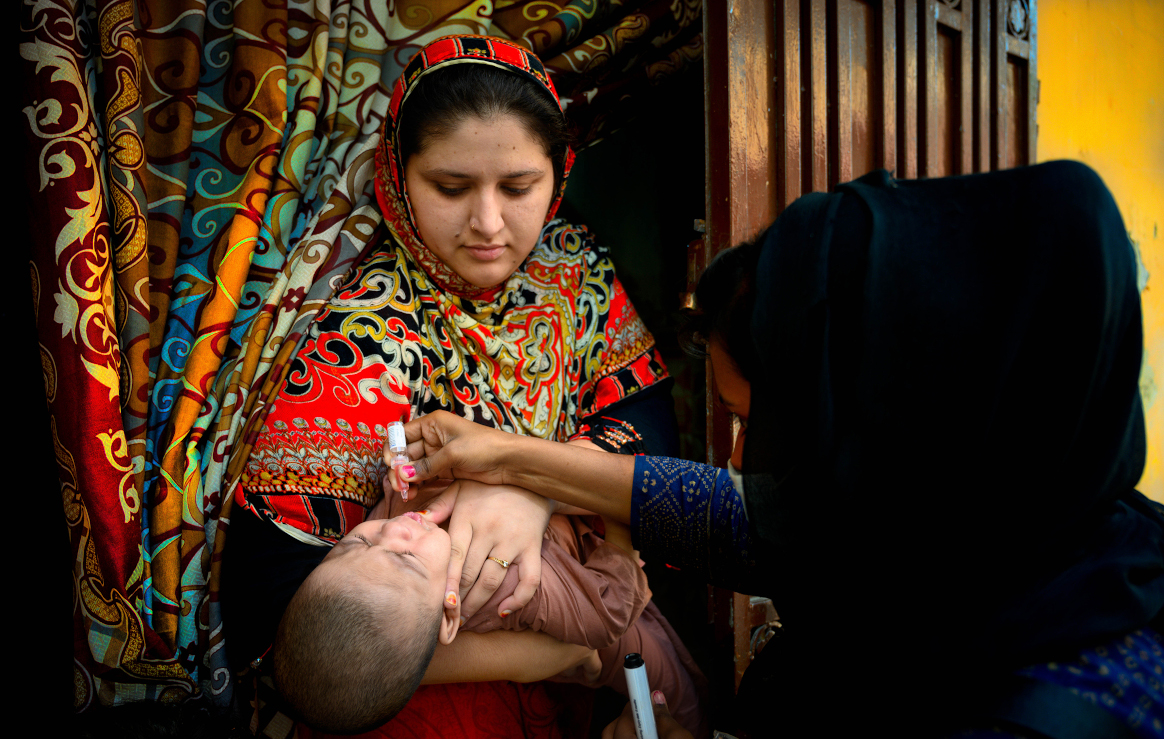
“This approach has helped us break down the barriers with caregivers and they are more receptive to communicating with us. We are dedicated to ensuring that our teams on the ground actively respect the religious and cultural norms of the local community. For instance, drummers like Zafar pause their beats during calls for prayer, demonstrating social and religious sensitivity. Additionally, the musical elements are in accordance with the cultural norms of the community,” adds Sajida.
In communities across Lahore and Rawalpindi where the ‘drummer’ strategy was introduced, polio teams managed to vaccinate every single available child. This was a significant contribution to the 96 per cent vaccination coverage achieved in the Punjab province during the recent campaign.
Meanwhile, back in Rawalpindi, Zafar’s percussion jam for polio eradication continues to reverberate in the neighborhood. A father himself, he made sure his youngest two-month-old daughter was vaccinated during the recent vaccination campaign.
“I feel very happy and blessed that the beats from my drums bring joy to people, and at the same time support an important cause that protects our children in Pakistan from deadly diseases like polio,” says Zafar with a smile.
By Wasif Mahmood,
UNICEF Polio Communication Officer, Provincial Emergency Operations Center, Punjab



